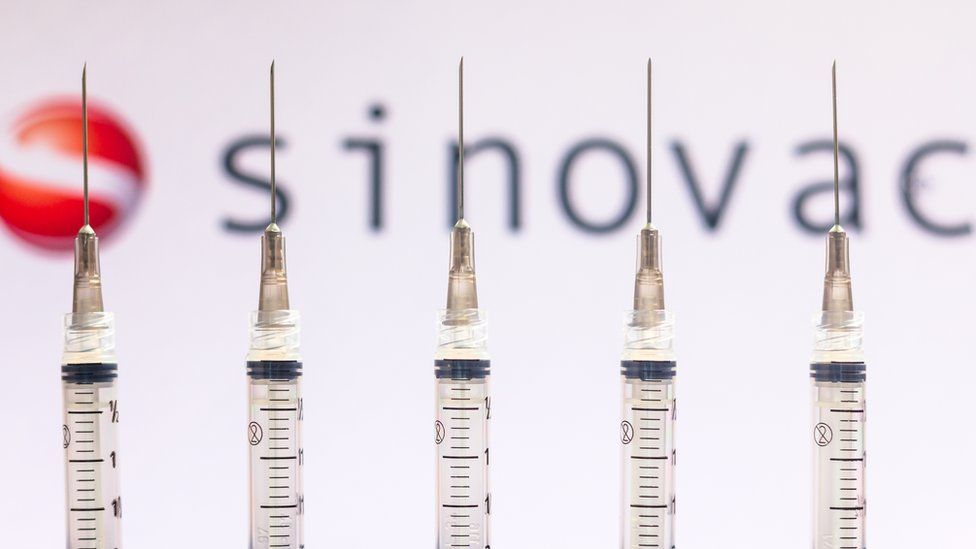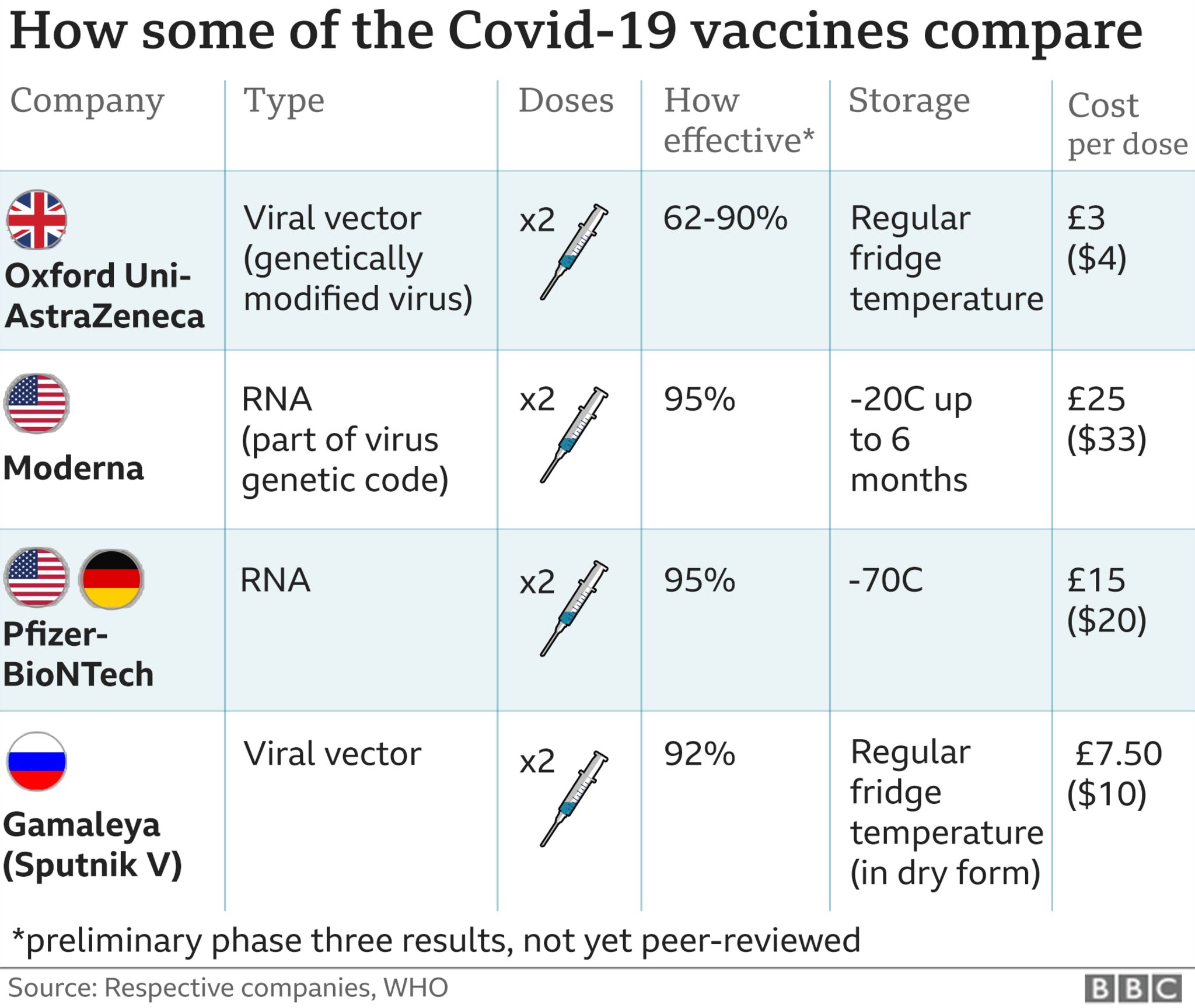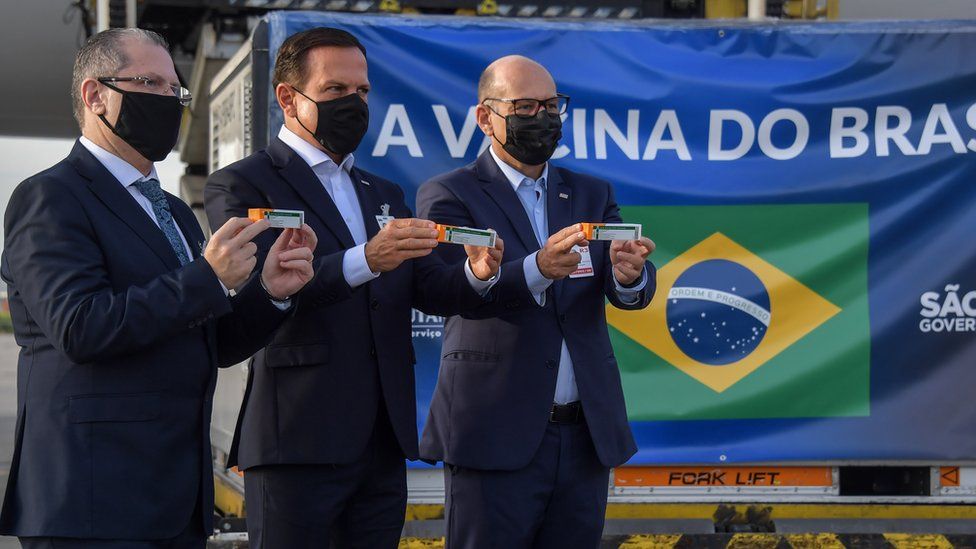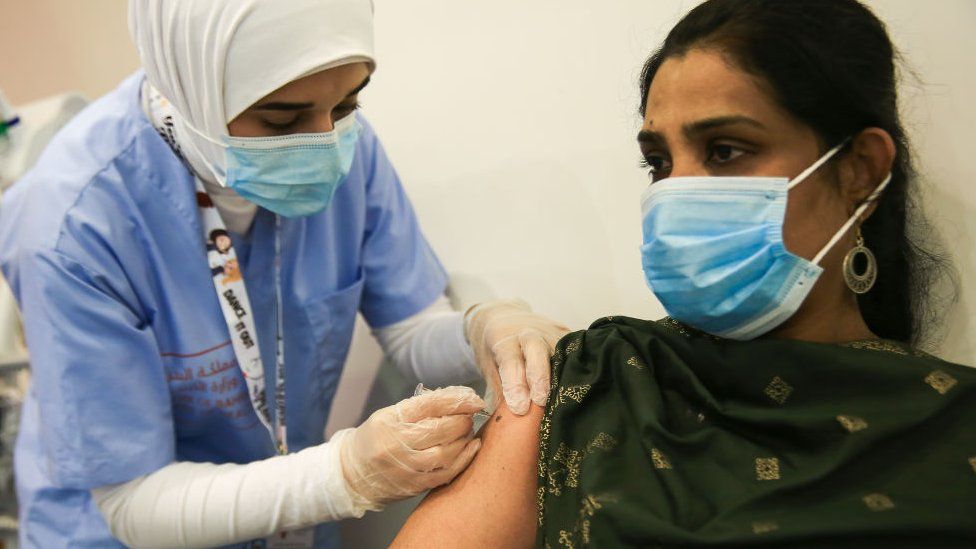| 外国人评论中国疫苗 原来疫苗都不便宜 |
| 送交者: 2021年03月26日19:27:59 于 [世界游戏论坛] 发送悄悄话 |
|
|
Covid: What do we know about China's coronavirus vaccines?
As the global race to produce a Covid-19 vaccine continues, China appears to have made huge strides, with vaccines from two front-runners - Sinovac and Sinopharm - already making their way abroad. But what do we know about China's vaccines and how do they compare to those being developed elsewhere? How does the Sinovac vaccine work?The Beijing-based biopharmaceutical company Sinovac is behind the CoronaVac, an inactivated vaccine. It works by using killed viral particles to expose the body's immune system to the virus without risking a serious disease response. By comparison the Moderna and Pfizer vaccines being developed in the West are mRNA vaccines. This means part of the coronavirus' genetic code is injected into the body, triggering the body to begin making viral proteins, but not the whole virus, which is enough to train the immune system to attack. "CoronaVac is a more traditional method [of vaccine] that is successfully used in many well known vaccines like rabies," Associate Prof Luo Dahai of the Nanyang Technological University told the BBC. "mRNA vaccines are a new type of vaccine and there is [currently] no successful example [of them] being used in the population," Prof Luo adds. On paper, one of Sinovac's main advantages is that it can be stored in a standard refrigerator at 2-8 degrees Celsius, like the Oxford vaccine, which is made from a genetically engineered virus that causes the common cold in chimpanzees. Moderna's vaccine needs to be stored at -20C and Pfizer's vaccine at -70C. It means that both Sinovac and the Oxford-AstraZeneca vaccine are a lot more useful to developing countries which might not be able to store large amounts of vaccine at such low temperatures. How effective is it?It's hard to say at this point in time. One Chinese study published in scientific journal The Lancet, only has information from the first and second phase trials of CoronaVac in China. Zhu Fengcai, one of the paper's authors, said those results - based on 144 participants in the phase one trial and 600 in the phase two trial - meant the vaccine was "suitable for emergency use". CoronaVac has been undergoing phase three trials in various countries. Interim data from late-stage trials in Turkey and Indonesia showed that the vaccine was 91.25% and 65.3% effective respectively. Researchers in Brazil initially said it was 78% effective in their clinical trials, but in January 2021 revised that figure to 50.4% after including more data in their calculations. Earlier in November, their trials were briefly halted after the reported death of a volunteer, but resumed after the death was found to have no links to the vaccine. Sinovac has been approved for emergency use in high-risk groups in China since July. In September, Mr Yin of Sinovac said tests were performed on more than 1,000 volunteers, of which "some only showed minor fatigue or discomfort… no more than 5%". Prof Luo had said ahead of the phase three results that it was difficult to make comments about the vaccine's efficacy at that point in time "given the limited information available". "Based on the preliminary data... CoronaVac is likely an effective vaccine, but we do need to wait for the results of the phase three trials," he said. "These trials are randomised, observer-blind, placebo-controlled... with thousands of participants. This is the only way to prove a vaccine is safe and effective to be used at the population level." What about the Sinopharm vaccine?Sinopharm, a Chinese state-owned company, is developing two Covid-19 vaccines, which, like Sinovac are also inactivated vaccines that work in a similar way. Sinopharm announced on 30 December that phase three trials of the vaccine showed that it was 79% effective - lower than that of Pfizer and Moderna. However, the United Arab Emirates, which approved a Sinopharm vaccine earlier this month, said the vaccine was 86% effective, according to interim results of its phase three trial. A company spokeswoman declined to explain the discrepancy, and said detailed results would be released later, said a Reuters report. But even ahead of the phase three trial results, the vaccine had already been distributed to nearly a million people in China under an emergency programme. Professor Dale Fisher, of the National University of Singapore, said then that it was "unconventional" to ramp up a vaccine programme without first going through last stage trials. "It is normal to wait for an analysis of phase three trials before ramping up a vaccine programme through emergency use authorisation," he told news site CNBC. Earlier in December, Peru suspended trials for the Sinopharm vaccine due to a "serious adverse event" affecting a volunteer. It later said that it lifted the suspension. A pause in a clinical trial is not unusual. In September, the UK paused trials for another Covid-19 vaccine after a participant had a suspected adverse reaction, resuming after the vaccine was ruled out as the cause. The spread of the coronavirus within China has for the most part been contained - and life is slowly but surely returning to a "new normal". Any other vaccine candidates?At least two other Covid-19 vaccines are under development in China, according to a recent article in The Conversation. One of them is CanSino Biologics, which is reportedly in phase three clinical trials in countries including Saudi Arabia. The other is being developed by Anhui Zhifei Longcom. Its vaccine uses a purified piece of the virus to trigger an immune response, and has recently entered phase three trials, according to the report. Which countries are signing up for China's vaccines?Several Asian countries including Singapore, Malaysia and the Philippines have signed deals with Sinovac, and in January 2021 Indonesia began rolling out its mass vaccination campaign with their vaccine. Turkey has also approved the Sinovac vaccine for emergency use. The company is also known to have secured other deals with Brazil and Chile. The United Arab Emirates and Bahrain have approved the Sinopharm vaccine. How would rollout work for China's vaccines?Sinovac will be able to produce 300 million doses a year in its newly built 20,000 sq m production plant, its chairman told state media outlet CGTN. Like all the other vaccines, it requires two doses, which means it is currently only able to inoculate 150m people a year - just over a tenth of China's population. Analysts point to China's bid to win the vaccine diplomacy race, which has also reportedly seen China's President Xi Jinping pledge to set aside $2bn for the African continent, while also offering Latin American and Caribbean countries a $1bn loan to buy vaccines. It's unclear what the terms of such a deal might be. "Beijing... will surely leverage the provision of this life-saving technology for commercial and diplomatic profit," Jacob Mardell, an analyst from MERICS, told ABC news. "[It] possesses something countries dearly need and will seek to paint the vaccine's provision as an act of charity." It's not clear how much it might cost, but earlier this year, a BBC team in the Chinese city of Yiwu saw that nurses were administering the injections for a fee of around 400 yuan ($60; £45). Bio Farma, a state-owned firm in Indonesia said it would cost around 200,000 rupiah ($13.60; £10) locally. That is still far higher than the Oxford vaccine, which costs $4 a dose, but lower than Moderna's at $33 per dose. Moderna has said it aims to ship 500 million doses in 2021 and AstraZeneca has said it will produce 700 million doses by the end of the first quarter of 2021. Reporting by Yvette Tan. |
|
|
 |
|
 |
| 实用资讯 | |
|
|
| 一周点击热帖 | 更多>> |
| 一周回复热帖 |
| 历史上的今天:回复热帖 |
| 2020: | 克服疫情完成交付 红箭12E出口“开门红 | |
| 2020: | 马云:在这场灾难面前,只有合作,互助 | |
| 2019: | 张国刚:丝绸之路如此发达,罗马、波斯 | |
| 2019: | 苏-57,被误解的英雄? 文/王永庆 | |
| 2017: | 港媒:港独势力一年多迅速大退潮 香港政 | |





